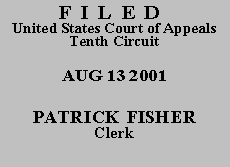

| TIMOTHY A. MAUK,
Plaintiff-Appellant, v. PRESBYTERIAN HEALTH PLAN, INC., Defendant-Appellee. |
|
Plaintiff brought this action alleging violation of the Americans with Disabilities Act (ADA); he maintains that defendant terminated his employment because of his disability. The district court granted summary judgment in favor of defendant, and plaintiff appeals. After de novo review, see Selenke v. Med. Imaging of Colo., 248 F.3d 1249, 1255 (10th Cir. 2001), we affirm.
In an ADA case, the plaintiff bears the initial burden of establishing a prima facie case of discrimination, which requires three showings: that he is disabled within the meaning of the ADA; that he was qualified to perform the essential functions of the job, with or without reasonable accommodation; and that he was discriminated against because of his disability. Butler v. City of Prairie Vill., 172 F.3d 736, 747-48 (10th Cir. 1999). Here, there was no dispute that plaintiff made the first two showings. Thus, the district court focused on whether plaintiff met the third requirement by showing that defendant "terminated h[is] employment under circumstances giving rise to an inference that the action was based on h[is] disability." See Selenke, 248 F.3d at 1259. To meet this burden, plaintiff must "present some affirmative evidence that disability was a determining factor in the employer's decision." Id. (quotation omitted).
If a plaintiff establishes a prima facie case,
the burden shifts to the employer to offer a legitimate, nondiscriminatory reason for the challenged action. If the defendant articulates such a reason, then the plaintiff may prove that it is merely a pretext for unlawful discrimination on the basis of h[is] disability. At all times, the plaintiff retains the ultimate burden of proving such discrimination.
Id. (citations omitted).
In granting summary judgment, the district court held that plaintiff did not establish a prima facie case because he did not show that the circumstances surrounding the termination gave rise to an inference that the action was based on his disability. Alternatively, the district court noted that, even if plaintiff had established a prima facie case, the record did not contain evidence raising an issue of material fact as to pretext. On appeal, we will assume without deciding that plaintiff established a prima facie case, because we hold that summary judgment on this record was proper based on plaintiff's failure to provide evidence of pretext. See Bullington v. United Air Lines, Inc., 186 F.3d 1301, 1316 (10th Cir. 1999).
We agree with the district court that the record contains no evidence from which a reasonable factfinder could conclude that defendant's stated reasons for terminating plaintiff's employment were pretextual. See Selenke, 248 F.3d at 1261. Plaintiff acknowledges that he made errors which his supervisor corrected, and he also acknowledges certain situations that occurred with coworkers. He simply offers different interpretations of the situations and the seriousness of his errors. In short, his disputes boil down to differences between his view of appropriate management and that of defendant. See id. In addition, plaintiff's evidence that a temporary employee was responsible for the letter-duplication incident does not further his argument of pretext because the record indicates that it was plaintiff's responsibility to ensure that the task was completed correctly. App. at 112.
In sum, we assume that plaintiff established a prima facie case of discrimination on account of his disability, but we agree with the district court that plaintiff did not carry his burden of establishing pretext. The record supports summary judgment based on that basis. AFFIRMED.
Entered for the Court
Senior Circuit Judge
*. This order and judgment is not binding precedent, except under the doctrines of law of the case, res judicata, and collateral estoppel. The court generally disfavors the citation of orders and judgments; nevertheless, an order and judgment may be cited under the terms and conditions of 10th Cir. R. 36.3.